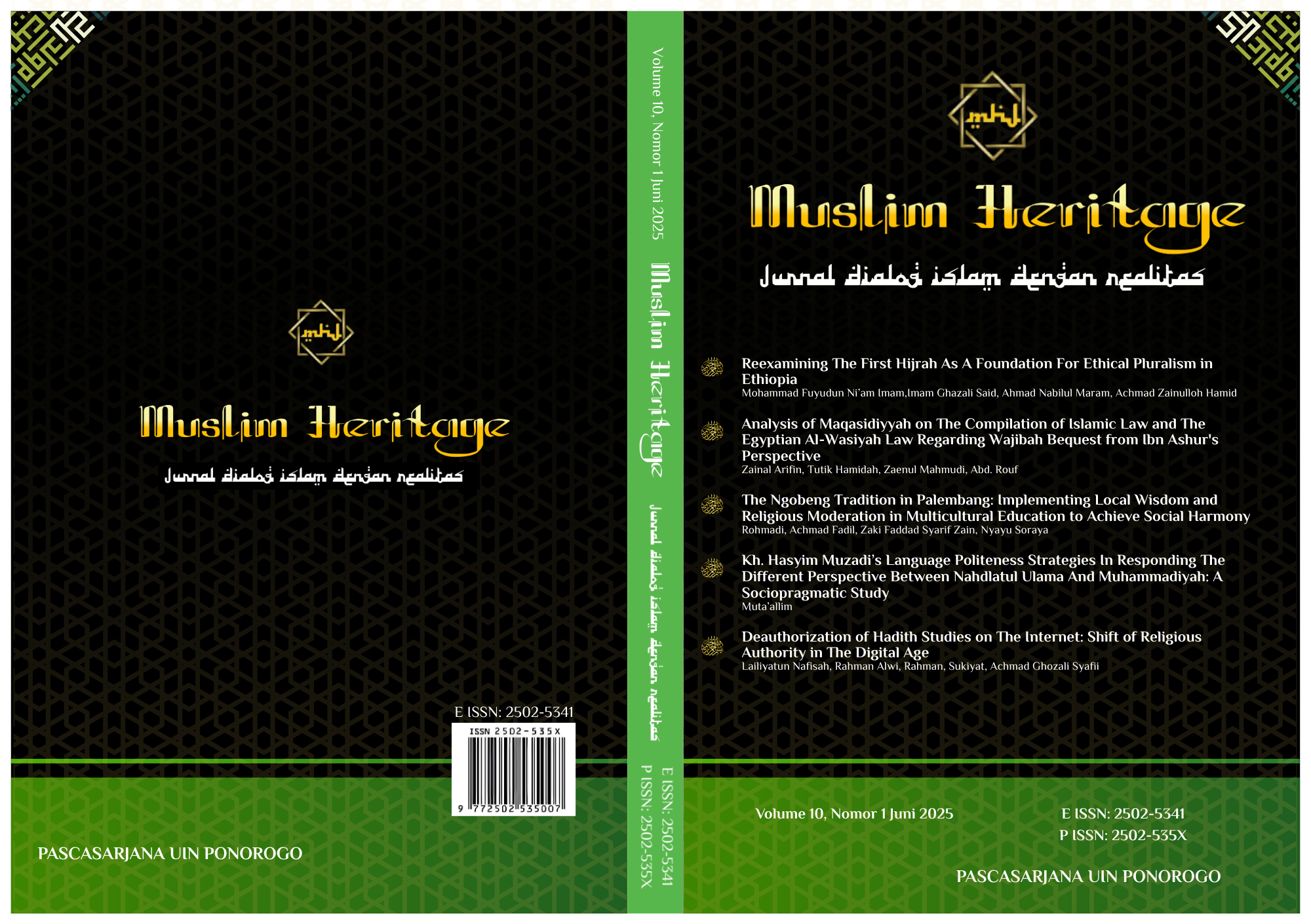Reexamining The First Hijrah as A Foundation for Ethical Pluralism in Ethiopia
DOI:
https://doi.org/10.21154/muslimheritage.v10i1.11183Abstract
Abstract
This article revisits the First Hijrah to Abyssinia and the Muslim community’s engagement with the Christian kingdom of Najāshī as a foundational narrative for ethical pluralism and shared political sovereignty within Islamic thought. In contrast to conventional historiography that marginalizes Islam’s role in Ethiopia’s state formation, this study foregrounds the early interfaith alliance between Muslim migrants and their Christian host, King Najāshī. Drawing on classical sources such as Ibn Hishām, al-Sarakhsī, and al-Shāfiʿī, the article reconstructs the legal and ethical discourse surrounding Muslim military involvement in Najāshī’s defense. It critiques traditional jurisprudential interpretations that condition Muslim solidarity on Najāshī’s conversion to Islam and instead emphasizes a paradigm of mutual protection founded on trust and civic responsibility. By contextualizing this episode within Ethiopia’s religious historiography and political tensions, the study challenges nationalist and colonial narratives that erase Muslim agency. The findings advocate for reviving this legacy of interfaith coexistence as a model for ethical citizenship in plural societies—affirming the right to live together through a shared commitment to justice rather than doctrinal uniformity.
Abstrak
Artikel ini meninjau kembali peristiwa Hijrah Pertama ke Habasyah dan keterlibatan komunitas Muslim dengan kerajaan Kristen Najāshī sebagai narasi dasar bagi pluralisme etis dan kedaulatan politik bersama dalam tradisi pemikiran Islam. Berbeda dengan historiografi konvensional yang meminggirkan peran Islam dalam pembentukan negara di Ethiopia, kajian ini menyoroti aliansi antaragama pada masa awal antara para migran Muslim dan tuan rumah Kristen mereka, Raja Najāshī. Dengan merujuk pada sumber-sumber klasik seperti Ibn Hishām, al-Sarakhsī, dan al-Shāfiʿī, artikel ini merekonstruksi wacana hukum dan etika mengenai keterlibatan militer Muslim dalam membela Najāshī. Tulisan ini mengkritisi pandangan fikih tradisional yang menggantungkan legitimasi solidaritas Muslim pada konversi Najāshī ke dalam Islam, dan justru menekankan paradigma perlindungan timbal balik yang didasarkan pada rasa saling percaya dan tanggung jawab sipil. Dengan membingkai episode ini dalam lanskap historiografi keagamaan dan ketegangan politik di Ethiopia, studi ini menantang representasi nasionalis dan kolonial yang menghapus agensi Muslim. Temuan artikel ini menegaskan pentingnya menghidupkan kembali warisan koeksistensi lintas iman tersebut sebagai model kewargaan etis dalam masyarakat plural, yang menegaskan hak untuk hidup berdampingan melalui komitmen bersama terhadap keadilan, bukan melalui keseragaman doktrinal.
Keywords: Abyssinia; Ethical pluralism; Ethiopia; Interfaith relations; Islamic political ethics
Downloads
Published
Issue
Section
License

This work is licensed under a Creative Commons Attribution-NonCommercial 4.0 International License.
Requirements to be met by the author as follows:
- Author storing copyright and grant the journal right of first publication manuscripts simultaneously with licensed under the Creative Commons Attribution License that allows others to share the work with a statement of the work's authorship and initial publication in this journal.
- Authors can enter into the preparation of additional contractual separately for non-exclusive distribution of a rich version of the journal issue (eg:post it to an institutional repository or publish it in a book), with the recognition of initial publication in this journal.
- Authors are allowed and encouraged to post their work online (eg, in institutional repositories or on their website) prior to and during the submission process, because it can lead to productive exchanges, as well as citations earlier and more severe than published works. (see The Effect of Open Access).

















